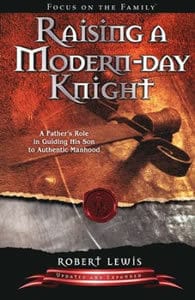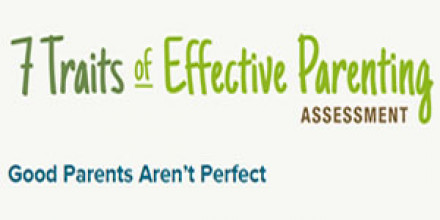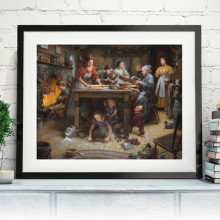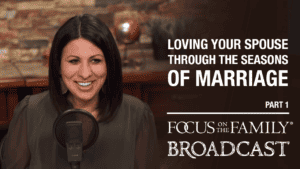Preview:
Robert Lewis: When you can identify some code of conduct that you admire, that you pursue, and you call your son up to with real world applications, in the midst of the battle of real life, that’s when those words take root and begin to germinate.
End of Preview
John Fuller: Robert Lewis joins us today on Focus on the Family. I’m John Fuller and your host is Focus president and author Jim Daly.
Jim Daly: And, John, as a dad of boys, I can say the father-son relationship is so special and boys need a dad who is engaged and intentional in teaching them what it means to be a man. Uh, here at Focus on the Family, we want to help you in your relationship with your children to be the best it can be, even if you didn’t have a good dad as a model. That’s pretty common. Robert Lewis has long been associated with this ministry. He wrote an outstanding book titled Raising a Modern-Day Knight for Focus on the Family and it’s been our number one bestseller for many, many years. So we want to share his message again today, how to raise your sons as honorable men, men of quality and character. And, while today’s conversation revolves around the father-son relationship, it’s a great opportunity for mom to listen in as well.
John: Yeah, I’d agree, and Pastor Robert Lewis is the founder of Men’s Fraternity, an organization that teaches men how to live, uh, lives of authentic Biblical manhood. Uh, he’s married to Sherard and they have four adult children. Let’s go ahead and pick up the conversation now on today’s Focus on the Family.
Jim: Uh, Robert, uh, getting to it, what do you think is missing in the way we are raising boys today?
Robert: Well, we have a big gap in, uh, this generation and the gap is that we’re assuming a lot that, uh, boys are going to grow up and understand not only what, uh, manhood is all about, but, uh, what are the key components to being an authentic man, and the problem is is that most of the things that we involve our young sons in tend to be things that build their exterior skills, like sports and academics and experiences and stuff-
Jim: Which are important-
Robert: … which are very important, and I-
Jim: … but shouldn’t be the most important.
Robert: That’s exactly right, and I’m not against any of those things.
Jim: Yeah.
Robert: My boys and I got involved in every one of those things. The problem is is the gap is we assume the interior skills of character, of godliness, of how to interact with a woman, how to understand myself, what God is all about, uh, how to connect with Him and what I’m supposed to experience as a young man, what are my responsibilities, both as a teenager and how do those connect to being a successful adult? Those dots are not being connected today by our culture, mainly because dad’s not there.
Jim: Right.
Robert: A good 40-plus percent aren’t even there, but the ones who are there, who … the ones that I work with a lot, don’t feel competent in giving those things away to their sons because they themselves aren’t clear about what they are. So, for starters, most dads don’t even have a definition of manhood to give away.
Jim: Now why is that? Is there a transmission problem generation to generation? Wh- wh- … men seem to not tell their sons what’s important about manhood and what you need to know. Is that one of the core problems?
Robert: It is because our institutions, uh, mainly the church and what used to be more of a Judeo-Christian culture, used to emphasize giving away certain aspects of those, but for whatever reason, we’ve gone dark and so what we’re raising today is what I call dark manhood. You have dark matter in the universe. You know it’s there, but you can’t see it. There’s a dark manhood where guys look like men, but they aren’t men. They’re dark manhood men. And so to give away that, there has to be a new way of heralding to this generation what are the most important things that boys need to be successful men, not just generally, from a secular standpoint with a strong interior, but especially for us as Christians, what is it that builds a healthy manhood interior for the next generation? I don’t think we’re clear about that. We’re not talking about those things and, because we’re not talking about those things, dads don’t feel competent in what to seize and give away to their sons.
Jim: Before we get to some of the practical application, this topic comes out of your heart and your own, uh, well, lack of father. Uh, tell us about your experiences as a boy growing up and why this is so important to you.
Robert: Yeah. I think part of the strength I possess now is because of part of the vacuum of what I grew up in because I grew up in dark manhood. I grew up as one of three sons underneath a dad who was, uh, a war veteran, which I’m very proud of, by the way, that he did serve, uh, honorably in the service. And, uh, my dad was the kind of guy, like the Greatest Generation, that came home and put his nose to the grindstone to provide materially, but didn’t know how to provide spiritually or socially. So I call my formative years with my two brothers, uh, growing up in a home where Dad was there, but he wasn’t Dad … in fact, I got to where I called him the invisible dad. He was around, but you couldn’t touch him and you couldn’t feel his heart.
Jim: How did you and your brothers process that as 12, 13, 14-year-old boys? I mean, what was happening-
Robert: (laughs).
Jim: … in the relationship? What did that look like when you talked about it? Did you talk about it as brothers?
Robert: No. We, we basically kind of made up life in a small town as best we could, and my brothers and I each went different ways. We each are gifted in different ways. My oldest brother was more of the artist. My, uh, younger brother was more of the outdoorsman and fisherman and intellectual, uh-
Jim: How do you describe yourself?
Robert: I was more of the action guy. I just wanted to get involved in sports-
Jim: (laughs).
Robert: … so I just lost my life in sports and I was on every sports team in our little town and, ultimately, that was my way out of town because I was good enough to play college football at the University of Arkansas during some of its glory years. So I had a really wonderful experience playing college football, but that was my way out of town and, and so sports was how I identified, uh, my life and, actually, for a few short years, thought it would be a vocation.
Jim: Robert, to add to that description, you and I share in this as, uh, both of our fathers were alcoholics-
Robert: They were. Yeah.
Jim: … and that, that really, uh, dampens down your respect oftentimes.
Robert: Right.
Jim: I mean, you had your dad in the military. But for those sons growing up where alcohol is part of their family life, either mom or dad, uh, you know, it doesn’t matter, or both, um, what did that look like for you and what actions did you see your dad do-
Robert: Mm-hmm.
Jim: … uh, in that environment and what did it do to you spiritually and emotionally?
Robert: Yeah. Well, my dad worked hard, I was always proud of that, but he also drank hard and, uh, it increased during, uh, my formative years into my teenage years and, and that became problematic. And when the home begins to break apart because Mom and Dad aren’t doing well, ’cause my mom was trying to reform my dad and she couldn’t do it, and so, for whatever reason, maybe because I’m a stronger personality than my brothers, I got drafted into that relationship to negotiate.
Jim: You’re the point man.
Robert: I was the negotiator.
Jim: (laughs).
Robert: So I was always trying to keep the peace. I was always trying to keep Dad straight. I was always trying to convince Mom why she shouldn’t leave or why she should have more patience. And what is really odd, there were times I was trying to counsel my mom how to better interact with my dad, which was totally insane for a 14 and 15-year-old.
Jim: That’s a lot of responsibility.
Robert: Oh, yeah, but I tried as best I could. I took a lot of shrapnel from both sides in trying to do that, which, I think, wounded me in ways I didn’t understand. Uh, in order to do that, I had to bury my emotions, which a lot of boys who grow up under alcoholics do. They have to put their emotions of shame, when guys would make fun of my dad for being drunk or when he didn’t show up for things like my ballgames or … which I cite in Raising a Modern-Day Knight, right at the very beginning, when he didn’t show up for my wedding. I mean, it’s a weird thing to be at a wedding where all … you know, we were a well-known family. My, all my college athletes at the time, who were my groomsmen, came. It was a huge wedding, my grandfather-in-law-was doing the service, and there we were with a lot of pomp and ceremony, but Dad wasn’t there-
Jim: Yeah.
Robert: … because Dad couldn’t handle it, so he drank himself into a stupor that weekend. And so you just carry a lot of shame and, at the same time, you’re trying to make it work.
Jim: Robert, the question for some of the guys listening right now would be, uh … you seemed to turn out okay. Um, for me, I didn’t have that dad. I still haven’t built that bridge. They might be in their twenties, they might be in their thirties or fifties and sixties-
Robert: Yeah.
Jim: … where that bridge to healing has not been built.
Robert: Yeah.
Jim: How does a guy who had that experience, like you or like me, how do you get on a better path to say, “Okay, I didn’t have it, but I’m going to give it to my son?”
Robert: That is a great question, and I’m not sure, apart from the grace of God, I got a great answer because I think what you do, when you’re one of those wounded sons, you grab for whatever gives you meaning. And, like I said, I grabbed for sports. My older brother grabbed for the arts, my younger brother, for books and classical guitar and hunting and fishing, and so we did that, but somewhere in there, that won’t be enough.
Jim: Mm-hmm.
Robert: And so, if you have a listener who’s listening there and he’s feeling a lot of emotion even talking about this, and sometimes, when you bridge it with anybody who’s got that background, immediately, that emotion kind of wells up and you can see it in their face and, if it’s not resolved, then my encouragement to them would be to look to Jesus Christ. That’s what I did.
Jim: And that’s a great answer and it sounds maybe overly used-
Robert: Yeah.
Jim: … but it’s right answer.
Robert: It, it is the right answer.
Jim: You got to turn to God and read His word-
Robert: Yeah.
Jim: … and understand what a father is ’cause He’s the ultimate father.
Robert: And I, and I, and I’m so grateful, uh, I say, from an earthly viewpoint, I stumbled into it. From a divine viewpoint, I think God helped lead me into it, but, uh, in that interaction in finding Jesus, I also found a book that had answers in it that I’d never read, ’cause we didn’t grow up in a church home. So I started reading the Bible and, all of a sudden, questions about friendships and about shame and about guilt and about marriage and about girls and stuff, I found answers that, with the help of others, I put into practice, and maybe ’cause I’m a results-oriented person, they worked.
Jim: (laughs).
Robert: I couldn’t believe they worked.
Jim: That’s the bottom line.
Robert: And, all of a sudden, it gave me a sense of, okay, I can hang on to this and, plus, it had an eternal tale to it, so I go, “This can go on forever.” And it was in that, with friends, that then led to an adventure with Jesus that has persisted to this day that I’m still … I think, if there’s a word, a banner over my life, it’s just grateful-
Jim: Yeah.
John: Mm-hmm.
Robert: … grateful for all of that.
Jim: Uh, it’s so good. Uh, speak to the wife and the mom who is seeing a lack of, uh, interaction with her husband, the father of her children, she’s concerned, and I’ve had this conversation from time to time. Our vocations can be demanding. Um, Jean and I, the conversation might be, “We need more spiritual training with the kids.”
Robert: Mm-hmm.
Jim: Um, you got to engage.
Robert: Right.
Jim: And, uh, a lot of moms and wives will begin to think through how they can, if I could say it, manipulate (laughing) their husbands into doing more. What’s a constructive way for a wife and mom to say to her husband, “We need more,” without the husband saying, “Wait a minute, don’t you know what I do for this household?”
Robert: Well, I’ve, I bet I’ve had a 1,000 conversations, being a pastor, that has addressed this very issue by women, uh, reaching out to me who felt abandoned or hurt or with questions with no answers and saying, “Help me,” and I would say, uh, divine manipulation is a good word because, you know, the scripture speaks to men who are kind of off track a little bit and it says that the wives are to win them without a word. I think direct instruction to a wayward husband or a faltering husband will always hit a dead end-
Jim: Huh.
Robert: … so I’d say don’t do that. That’d be my first statement.
Jim: And most wives are saying, “What?”
Robert: Yeah, don’t-
Jim: “I don’t know that I believe that.”
Robert: …I’d say lay off. The second thing is where I’d call the divine manipulation because, if a wife, and I would’ve said, “I wish I would’ve known this to tell my mom,” if a wife can survey the social landscape around their family and maybe the church they go to and, if not the church, just their friends, they can find healthy families or healthy groups to go to and simply with a soft word to a coach or a pastor or a man who’s doing well in his marriage and say, you know, “We’re struggling a little bit. Would you mind reaching out to my husband and including him in X?”. It might be a group, uh, it might be you’re playing sports together, “Would you mind inviting him to the next game just to go with you to watch our sons play? He needs some encouragement, some involvement, and you seem like you’re offering a lot. I’m not asking you to do anything other than just befriend him a little closer.” If they’re real close friends, you might go even a little further, say, “Invite him to the group that you’re going to.” Maybe it’s a men’s group or maybe it’s, uh, a fishing club or what … I don’t know what it could be, but there are ways to do that. That would be number one, to encourage the husband to get stimulation from other stronger men, but without it being a putdown or a correction, just-
Jim: Right, ’cause-
Robert: … “Join me.”
Jim: … yeah, men walk the other way when it’s a putdown.
Robert: That would be number one.
Jim: Shame, we don’t do well with shame.
Robert: That’s exactly right. You’re, it’ll never work.
Jim: Never.
Robert: I just want to tell the wives out there, hear me, it’ll never work. The second thing is, for your son, which I think my mom did do some of this, and I’m thankful for that, I think I would put my son, if dad’s not involved, in the most masculine environments I could get him in that are healthy.
Jim: Yeah.
Robert: And so my mom got me in Little League. She got me, for a time, I didn’t stay, but with a Methodist youth group. I dropped out, but that was my choice. She put me in places where there were men around-
Jim: Positive environments.
Robert: … positive environments, and that’s where I got my love for sports, and she complimented me on, uh, some of my successes, especially in football. So by the time I hit high school, I was starting to be a pretty good athlete, and I think there was a word spoken to my coach, my head coach, where he took a little bit extra noticing of me because my dad wasn’t around.
Jim: Yeah.
Robert: He didn’t have to do it, but he did it, and out of that came this mentoring relationship by my coach that changed my life because he believed in me. And let me tell you, Jim, my coach, by my senior year, could look at me and knight me with his eyes.
Jim: Huh.
Robert: And I’ll never forget this, I still have a picture where it’s our banquet, our football banquet, and they’re giving out trophies to all the players. I expected to win the Most Valuable Defensive Player, and they gave it to somebody else. I remember I was stunned. And then, at the very end of the banquet, my head coach came up and he said, “We’ve created a new trophy. We’re going to call it the Coaches’ Trophy to the athlete that we think best embodies the spirit, the effort, and the excellence by which we coaches want our athletes to be and we’re going to make this the trophy that we’re going to give from this point on to the athlete we think has had the greatest influence.” And my head coach gave that first trophy, which is still the preeminent trophy at our high school, to me.
Jim: Yeah.
John: Mm-hmm.
Robert: And there’s a picture of me standing there with my coach, Coach Garrett, who my firstborn son is named after. His name is Garrett for a reason.
Jim: Yeah, he made an impact.
Robert: He put the eagle’s wings on my shirt and I’ve flown with that strength ever since, and I had the chance to come back and thank him for that knighting that he had no clue of other than the involvement that he had with me as an older, healthy man giving me, as a young, clueless guy, a vision to work hard, do right, live pure, and maybe things will turn out pretty good.
John: You’re listening to Dr. Robert Lewis today on Focus on the Family, and you heard him just now mentioning knighting as in the ceremony of older times in which men became knights to serve their king. And, uh, that ceremony and that concept are part of, uh, the title of Robert’s bestselling book, Raising a Modern-Day Knight, and you can get your copy today at focusonthefamily.com/broadcast. And let’s go back now to the conversation with Robert Lewis on today’s episode of Focus on the Family.
Jim: Robert, let’s get into some of the book content. Um, uh, this is part of it. We haven’t, you know, gone out of our way here, but, uh, what are some of the set of ideals that we should be imparting into our sons as dads?
Robert: Yeah. Well, first thing I would say to a listening dad is you are way more important than you think you are and we’re not talking about massive effort in saying that. We’re not talking about you’ve got to become some kind of excellent, well-scripted dad who’s got it all together. We’re talking about dads like me, who are fumblers, mistake-makers, um, have got to ask for forgiveness often, but who at least grab on to the fact that we are the greatest influence in our son’s life and, if we will impart just a little father food to our sons, invariably, it has great results. So if I were telling a dad, if I just had a brief moment to instruct a dad and say, “Here are some things you need to give your son,” I would point to three things immediately. The first would be you need to give definition to your son about what a man is, you need to define it, and if you don’t know what it is, maybe I can help you (laughs) as, uh, a writer, as a author, uh, help you define that in a way that you would be excited about that definition, but you could give away for your son, because here’s what I’ve learned and I’ve told dads over and over again, you cannot impart to your son what you can’t define. And if you can’t define manhood, about the only thing you can do … and I hear dads say it all the time at ballgames and stuff, it’s when they yell and scream at their son, “Be a man! Be a man!” And I always want to pause that moment and just go out and say, “Okay, so what do you mean by that?” Well, he probably couldn’t tell me. It’s just a catchphrase, but if you can add substance to that phrase, you’ll give your son one of the greatest gifts he can ever receive and that is he can at least articulate what a man is and begin, hopefully, to measure his life by it. That’d be the first thing. The second thing is he needs some practical applications of how to live out that manhood. Again, it could be minimal, but, at best, I would want a son to know how to work, just a few key work things. I’d want him to know how to live with a woman, which he could practice on mom. And all these things are in numerous books, but if you could just get a few of these and practice it with your son and keep articulating this, which is so key, “Son, this is what a man is,” ’cause he’s hearing what a man is from the world all the time where it’s, you know, the ball field, the bedroom, or the boardroom, exterior manhood. You’re talking interior manhood, “This is how you love a woman. You get up and help Mom do this. You’re loving Mom. You write Mom on Mother’s Day more than just a card with, ‘Love, son,’ you say, ‘Mom, here’s how you’re important.’ You articulate because women need to hear words of affirmation, words of affection, those kind of …” So you’re teaching those things, so he needs some practical direction, just a few, Dad. You’re putting your son in the big leagues with just a few directions. And then the last thing, which the book, Modern-Day Knight, really focuses on, it would be wonderful if I could instruct you on how to do a couple of manhood ceremonies where you could bring great men in his life together and just authorize him into that definition. If you did those three things, you’ll move your son from elementary manhood to in the big leagues.
Jim: That’s good. I want to go back to definition-
Robert: Okay.
Jim: … ’cause I’m that guy. Tell me, I’m sitting there with you having coffee at a restaurant-
Robert: Yeah.
Jim: … and I’m struggling-
Robert: Yeah.
Jim: … what is the definition of manhood?
Robert: Yeah. Well, the definition is something I worked, honestly, three or four years on because, when I first started this manhood journey as a young, failing 20-something who was pastoring a church where men were kind of asking me that question, I had no answer. So just going into the scriptures, just asking that question, and, finally, what emerged was there are really only two archetype men in scripture and they’re both named the man. There’s Adam, and the Hebrew word for Adam, is man and then there’s the second Adam, Adam, which is Jesus Christ. In fact, He’s called the second man in the New Testament, so you really have two men only in scripture that represent true manhood. And as Herman Ridderbos, the theologian, said, he said every man in history falls under the shadow of either the first Adam, who was, unfortunately, disobedient and wayward, or the second Adam, who was clued in, knew what God expected in defining him as a man, and lived it out. So I took those two and just compared them to one another-
Jim: Huh.
Robert: … and then what I came up with was really just kind of, uh, the Robert Lewis hands-on version of how you take those two men and what they were called to be and one didn’t and the other did, what manhood revolved around, and, at the heart of it, it was around responsibility because, when God created the first man, he gave four responsibilities to that man. They were these: they were to obey God’s word, to love God’s woman, to excel at God’s work, and to better God’s world. Those are the four responsibilities, I call it quadraphonic manhood, that every man needs to measure his life by through his life, not focus on just one like men do, man, manhood is work or what do I achieve, that’s one-dimensional manhood, but all four. And, if you end up at the back end of life, where I’m getting to right now, and you can say, you know, “I’ve really tried to pattern myself after God’s word. I, I’ve been faithful to God’s woman. I, I’ve worked hard to be a good worker. I saw work not as just work. I saw it as sacred, a way to honor God. And, through the use of my gifts, whether it was at my church or in my community, I helped better God’s world,” I think you live out the script of what authentic manhood is. Now to do that, you’ve got to do some things Adam didn’t do. Adam became passive and rejected those responsibilities-
Jim: Mm-hmm.
Robert: … and I think that waywardness lives in every man ever since. We all are naturally (laughs) passive when it comes to social and spiritual responsibility, so to accept those four responsibilities, the first thing a man has to do is reject passivity. Then he can embrace those responsibilities, but then to live out those responsibilities, a young boy, like my sons, need to be told, “Let me tell you, those responsibilities are hard. They’re going to take everything you got, so you’ve got to live courageously. You’ve got to fight through feelings and keep going back to those, even when you fail, and the thing that keeps you steady in those difficult times is you’ve got to believe, on the back end, God will reward you.” Okay? So if I could summarize over a coffee talk with you and you said, “Okay, well, tell me what a man is,” here’s what I’d say, a real man has to reject passivity because only until he says there’s some other manhood out there that’s bigger than what I can make up, it’s God’s manhood, so I’m going to accept responsibility for God’s manhood, which entails obeying God’s word, loving God’s woman, excelling at God’s work, and bettering God’s world. I’m going to accept those even though they’re hard and then, over the course of time, through the help of other men and God’s holy spirit and His word and His church and others, I’m going to live courageously. I’m going to keep clawing at it so that, at the end, I can experience God’s greater reward in all of that and walk into eternity and God would say, “You lived like a man.”
John: And that’s where we’re going to have to pause for today’s episode of Focus on the Family with our guest Robert Lewis, and he had such strong insights and great wisdom, Jim.
Jim: He did. Uh, this is really good content that every dad can draw from and, as you’ve been listening today, I hope this conversation has really spoken to your heart and encouraged you. Dads can have such a powerful influence in their sons’ lives. Modeling Godly behavior, character, and integrity is a solid start, um, and that’s why Focus on the Family is here. We have numerous resources available to you, such as our 7 Traits of Effective Parenting assessment. It’s Biblically based and backed by research to help you discover your parenting strengths and areas for growth and identify the skills you need to raise healthy, mature, and responsible children. Uh, we also have the book by Robert Lewis that we mentioned today, Raising a Modern-Day Knight, and we’d love to send you a copy as our way of saying thank you when you pledge to be a partner with the ministry at Focus on the Family on a monthly basis. By doing so, you are helping parents receive the answers they need to raise strong, healthy, resilient kids. If you can’t make that kind of commitment, we get that, but we’ll also send that to you for a one-time gift of any amount.
John: Yeah, donate as you can and, uh, take that assessment. Get your copy of Raising a Modern-Day Knight. All the details are at focusonthefamily.com/broadcast or call 800, the letter A, and the word FAMILY. On behalf of Jim Daly and the entire team, thanks for joining us today for Focus on the Family. I’m John Fuller inviting you back as we have more of the conversation with Robert Lewis and, once again, help you and your family thrive in Christ.























